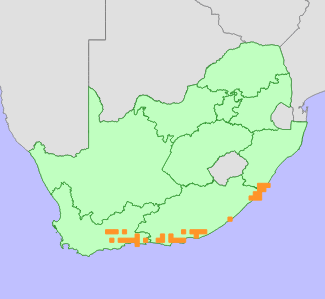|
Scientific Name | Rafnia elliptica Thunb. |
Higher Classification | Dicotyledons |
Family | FABACEAE |
Synonyms | Rafnia affinis Harv., Rafnia axillaris Benth., Rafnia axillaris Harv., Rafnia axillaris Thunb., Rafnia cuneifolia E.Mey. (later homonym), not of Thunb. (1800), Rafnia elliptica Benth., Rafnia elliptica Thunb. var. acuminata Harv., Rafnia elliptica Thunb. var. erecta Harv., Rafnia elliptica Thunb. var. intermedia (Walp.) Harv., Rafnia erecta Eckl. & Zeyh. (later homonym), not of Thunb. (1800), Rafnia intermedia Benth., Rafnia intermedia Vogel ex Walp., Rafnia retroflexa Eckl. & Zeyh. (later homonym), not of Thunb. (1800) |
National Status |
Status and Criteria | Least Concern |
Assessment Date | 2020/03/19 |
Assessor(s) | L. von Staden |
Justification | Rafnia elliptica is widespread with an extent of occurrence (EOO) of 118 951 km². It is not in danger of extinction, and is therefore listed as Least Concern. |
Distribution |
Endemism | South African endemic |
Provincial distribution | Eastern Cape, KwaZulu-Natal, Western Cape |
Range | This species is endemic to South Africa, and occurs from the Swartberg and Langeberg Mountains in the Western Cape eastwards to the southern KwaZulu-Natal coast. |
Habitat and Ecology |
Major system | Terrestrial |
Major habitats | Tsitsikamma Sandstone Fynbos, KwaZulu-Natal Coastal Belt Grassland, Pondoland-Ugu Sandstone Coastal Sourveld, Transkei Coastal Belt, Knysna Sand Fynbos, Suurberg Quartzite Fynbos, South Langeberg Sandstone Fynbos, Grahamstown Grassland Thicket, South Outeniqua Sandstone Fynbos, Algoa Sandstone Fynbos, North Swartberg Sandstone Fynbos, South Swartberg Sandstone Fynbos, North Kammanassie Sandstone Fynbos, South Kammanassie Sandstone Fynbos, Kouga Sandstone Fynbos, Kouga Grassy Sandstone Fynbos, North Outeniqua Sandstone Fynbos |
Description | It occurs in sandy, grassy coastal fynbos, and in transitional vegetation between renosterveld and dry fynbos. In KwaZulu-Natal, it occurs in coastal grasslands associated with sandstone-derived soils. |
Threats |
| Threats to Rafnia elliptica include habitat degradation, habitat loss, harvesting and invasive alien species. |
Population |
There is no information available on the population of this species.
|
Population trend | Stable |
Assessment History |
Taxon assessed |
Status and Criteria |
Citation/Red List version | | Rafnia elliptica Thunb. | Least Concern | Raimondo et al. (2009) | |
Bibliography |
Campbell, G.J. and Van Wyk, B.-E. 2001. A taxonomic revision of Rafnia (Fabaceae, Crotalarieae). South African Journal of Botany 67(2):90-149.
Goldblatt, P. and Manning, J.C. 2000. Cape Plants: A conspectus of the Cape Flora of South Africa. Strelitzia 9. National Botanical Institute, Cape Town.
Raimondo, D., von Staden, L., Foden, W., Victor, J.E., Helme, N.A., Turner, R.C., Kamundi, D.A. and Manyama, P.A. 2009. Red List of South African Plants. Strelitzia 25. South African National Biodiversity Institute, Pretoria.
Vlok, J. and Schutte-Vlok, A.L. 2010. Plants of the Klein Karoo. Umdaus Press, Hatfield.
|
Citation |
| von Staden, L. 2020. Rafnia elliptica Thunb. National Assessment: Red List of South African Plants version 2024.1. Accessed on 2026/03/01 |
 Comment on this assessment
Comment on this assessment


